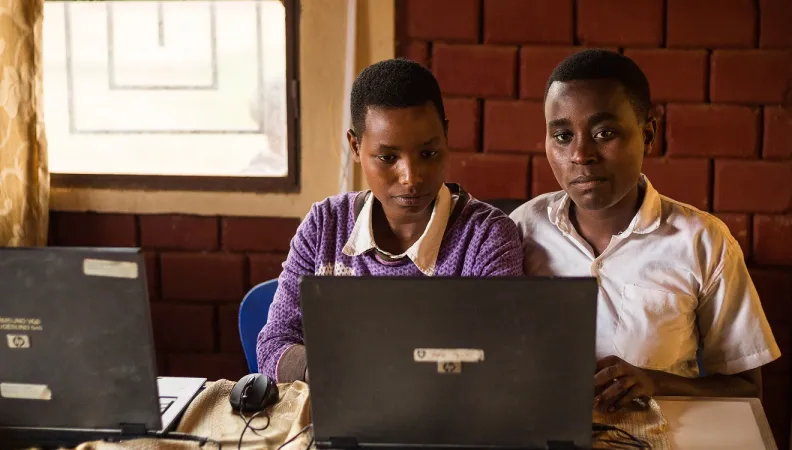Share the page
How AFD Contributes to Freedom of Information around the World
Published on

Last month, the Nobel Peace Prize 2021 was awarded to Russian and Filipino journalists Dmitri Mouratov and Maria Ressa for their courageous fight for freedom of expression. It’s the first ever Nobel award for journalism. Freedom of expression is a theme that AFD has been deeply involved in; three of the Group’s experts tell us more.
How long has AFD been taking action for the freedom of information?
Ambroise Pierre, Project Team Leader in AFD’s Governance Division:
We started financing projects dedicated to the freedom of the press and training for journalists, the strengthening of media and the fight against misinformation in 2016, when the Ministry for Europe and Foreign Affairs gave AFD the Governance mandate. But AFD had already been actively involved in these issues for over ten years through its support for projects led by civil society organizations.
Emilie Aberlen, Project Officer in AFD’s Civil Society Organizations Division:
AFD has become one of the main donors of the NGO Reporters Without Borders, through the CSO Initiatives Fund. The action initially focused on the protection of journalists and AFD has supported the transition towards the defense of independent and high-quality journalism, which is more than ever an essential condition for democratic life and respect for human rights. The increase in our portfolio of CSO initiatives in the media also shows how these issues have gained importance. An increasing number of projects in other sectors include media partners to carry out actions on awareness-raising, citizen control and advocacy.
Jean-Bertrand Mothes, Head of AFD’s Fragility, Crises and Conflicts Division:
AFD, through the CCC Division, has been sponsoring and presenting the Public’s Choice Award in the photo category of the Bayeux Calvados-Normandy Award for War Correspondents for eight years now. This year, the Palestinian photojournalist Abu Mustafa Ibraheem won the award for his report “Gaza: 11 Days of Bombing”.
Why work on these issues?
A. P.: Supporting freedom of expression and information means protecting a fundamental and essential freedom for democracy and development. There can be no transparency without access to information! There can also be no citizen participation or citizen control of public action without pluralism and the possibility of speaking publicly. It is for this reason that our projects at AFD focus on structuring the media and their ecosystem. Supporting the media is also a way of achieving the United Nations Sustainable Development Goals: they are spaces for dialogue, tools for inclusion and powerful drivers for cohesion, which can bring about changes on issues such as health, education and the climate.
J.-B. M.: One example is the Sahel region, which is in the midst of a series of crises. The media there has been weakened by a deteriorating environment, but do however provide an opportunity to give a voice back to young people and include them in public debate. In this region, we’ve been supporting the MediaSahel project since 2019 with CFI (France Médias Monde Group). The objective is to build the capacities of media that can reach young people and women, such as community radio stations and social networks. They are trained to produce attractive, independent, gender-responsive and conflict-sensitive content which gives a voice to young people and promotes their initiatives.
What other examples of projects can you tell us about?
A. P.: In the Middle East, we’re financing the Qarib project (“close” in Arabic), which aims to bring the authorities and citizens closer together through the media. This involves supporting the production of community content, assisting initiatives to fight against misinformation, helping independent media with their economic model and the diversification of their sources of income, and coordinating local, national and regional debates. This project is implemented by CFI in Iraq, Jordan, Lebanon and the Palestinian Territories and allows us to work with recognized regional operators, such as Arab Reporters for Investigative Journalism (ARIJ) and the Samir Kassir Foundation.
J.-B. M.: Another project, implemented under our Minka Lake Chad Initiative, is supporting Radio Ndarason Internationale (“Wherever you are” in Kanuri), a station based in Chad and north-east Nigeria, which also broadcasts in Cameroon and Niger. Since 2009, the development of the Lake Chad region has been severely affected by socioeconomic difficulties, a deterioration in the security situation, a humanitarian and food crisis and the displacement of millions of people. Inter-community tensions are increasing and social cohesion is being eroded. This radio station broadcasts in Kanuri, Kanembu, Buduma and French. In addition to helping it improve its procedures and overall operation, our support has allowed the station to develop a new news and regional dialogue program.
E. A.: In 2018, Reporters Without Borders, which we’ll be strengthening our partnership with in 2022, launched two major initiatives to fight against informational chaos and regulate the global information space. Our Group is currently supporting the participation of civil societies in the South in these initiatives. The objective is for them to be applied in the regulatory frameworks and journalistic practices of several other countries, such as Benin, Burkina Faso, Côte d’Ivoire, DRC, Lebanon, Mali, Senegal and Tunisia. With Orient XXI, we’re also supporting the development of independent news websites on the Arab world. This project is building a media network to strengthen professional skills and structure this media in Egypt, Jordan, Lebanon, Syria and Tunisia.
